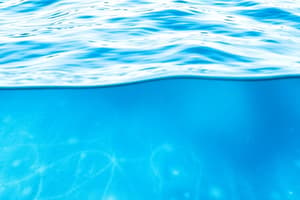Podcast
Questions and Answers
What is a significant drawback of desalination?
What is a significant drawback of desalination?
- It is a sustainable way to source fresh water.
- It has minimal environmental impact.
- It has low operational costs.
- It requires a large amount of energy. (correct)
How does the density of salt water compare to that of fresh water?
How does the density of salt water compare to that of fresh water?
- Salt water has the same density as fresh water.
- Density varies significantly in both types of water.
- Salt water has a higher density than fresh water. (correct)
- Salt water has a lower density than fresh water.
In the context of water, what effect does salt have on freezing points?
In the context of water, what effect does salt have on freezing points?
- Salt changes the freezing point only at high altitudes.
- Salt has no effect on the freezing point of water.
- Salt increases the freezing point of water.
- Salt decreases the freezing point of water. (correct)
What is one educational activity suggested to learn about salt vs. freshwater?
What is one educational activity suggested to learn about salt vs. freshwater?
Why is desalination considered expensive?
Why is desalination considered expensive?
What percentage of Earth's water is salty?
What percentage of Earth's water is salty?
What chemical compound primarily makes up the salt found in ocean water?
What chemical compound primarily makes up the salt found in ocean water?
How does runoff contribute to the salinity of ocean water?
How does runoff contribute to the salinity of ocean water?
What happens to rainwater that is unable to be absorbed by the soil?
What happens to rainwater that is unable to be absorbed by the soil?
What role do hydrothermal vents play in the ocean's salinity?
What role do hydrothermal vents play in the ocean's salinity?
Which of the following elements is NOT commonly found in ocean water due to runoff?
Which of the following elements is NOT commonly found in ocean water due to runoff?
What is the main reason sailors cannot drink ocean water?
What is the main reason sailors cannot drink ocean water?
What happens to rainwater when it flows over rocks and soil during runoff?
What happens to rainwater when it flows over rocks and soil during runoff?
What is the primary reason ocean water is saltier than lakes and rivers?
What is the primary reason ocean water is saltier than lakes and rivers?
Which of the following lakes is known for being saltier than the ocean?
Which of the following lakes is known for being saltier than the ocean?
What process describes the removal of salt from seawater?
What process describes the removal of salt from seawater?
Why do rivers and lakes not become as salty as oceans?
Why do rivers and lakes not become as salty as oceans?
Which condition may cause salt lakes to have higher salinity than ocean water?
Which condition may cause salt lakes to have higher salinity than ocean water?
What happens to salt levels in lakes during periods of heavy rainfall?
What happens to salt levels in lakes during periods of heavy rainfall?
What is the fate of drinking seawater for humans?
What is the fate of drinking seawater for humans?
What is a significant characteristic of overly salty lakes?
What is a significant characteristic of overly salty lakes?
Flashcards are hidden until you start studying
Study Notes
Why is Ocean Water Salty?
- Approximately 70% of Earth is covered by water, with 97% of oceans being salty.
- Ocean water is primarily made up of H2O, but also contains dissolved salts and minerals, including sodium and chloride.
- Salt in oceans comes from two main sources: runoff from land and underwater geological processes.
Runoff and Salinity
- Runoff is rainwater that cannot be absorbed by soil, flowing into rivers and eventually into oceans.
- Rainwater is mildly acidic and reacts with rocks, dissolving minerals that are carried into oceans.
- The combination of sodium and chloride in oceans forms sodium chloride, or table salt.
Geological Contributions
- Hydrothermal vents on the ocean floor release heated water rich in dissolved minerals, contributing to ocean salinity.
- Underwater volcanic eruptions also release minerals into the ocean, enhancing salt presence.
Freshwater vs. Saltwater
- Most lakes and rivers are freshwater and contain lower salt concentrations compared to oceans, thanks to continuous replenishment from rainfall.
- In some locations, such as the Great Salt Lake and the Dead Sea, certain lakes are much saltier than oceans due to evaporation and mineral-rich runoff.
- The Caspian Sea is the largest saline lake; some lakes can be ten times saltier than ocean water.
Health Implications of Salt Water
- Drinking seawater can be dangerous due to high salt content, leading to dehydration.
- The presence of salt water forces the body to excrete more water to process the excess salt, exacerbating thirst.
Desalination
- Desalination is the process of removing salt from seawater to make it drinkable; however, it is energy-intensive and costly.
- As droughts become more frequent, desalination is a topic of growing interest for providing alternative freshwater sources.
Educational Opportunities
- Activities and experiments, such as comparing saltwater and freshwater density or engaging in watercolor salt painting, can deepen the understanding of ocean water properties.
- Sharing findings and creations from experiments can enhance learning experiences and community engagement.
Studying That Suits You
Use AI to generate personalized quizzes and flashcards to suit your learning preferences.




